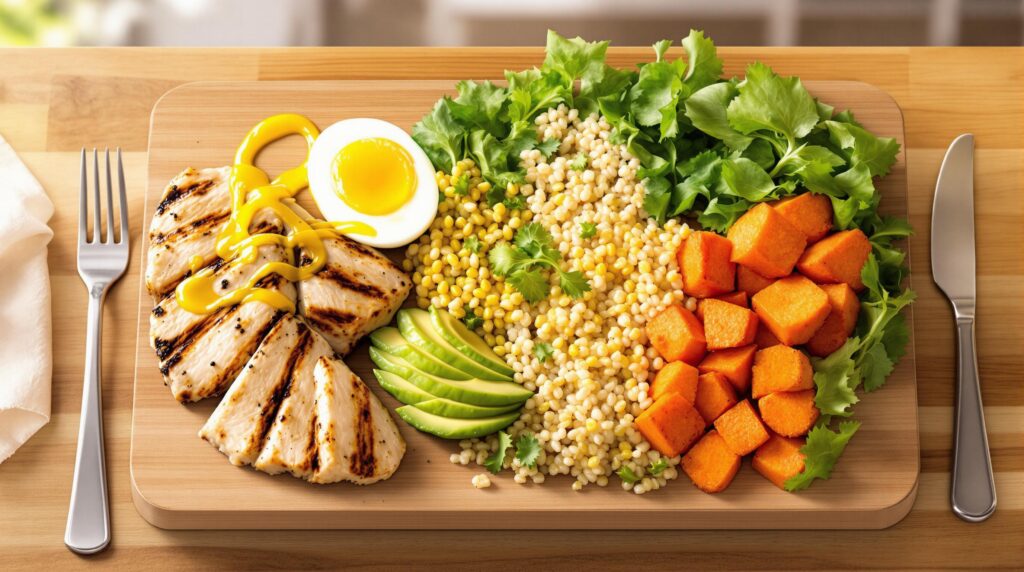Do you know your muscle-building diet might be missing something important? In today’s fitness world, many overlook the key role of a high-protein diet. A diet rich in protein can change your fitness journey, introducing meals that boost muscle growth and improve workout results.
By adding more protein to your meals, you can enhance your fitness routine. This will help you perform better and build more lean muscle. It’s a game-changer for your fitness journey.
Understanding Protein’s Role in Muscle Growth
Learning about protein’s role in muscle growth is key for better fitness. Protein is a vital nutrient that helps build and fix muscles. It’s essential for anyone wanting to improve their physical health.
What is Protein?
Protein is made of amino acids, which are vital for health. These amino acids help build muscles and support other body functions like hormone production and the immune system. Eating enough protein helps keep muscles healthy and boosts overall well-being.
How Protein Supports Muscles
Protein’s role in muscle growth is huge. Muscles get damaged during workouts, so they need repair. Protein gives the body the tools to fix these muscles, leading to stronger muscles over time.
When you eat the right amount of protein, your body uses it well. This helps improve your workout results.
Timing Your Protein Intake
When you eat protein matters a lot for muscle growth. Eating protein before or after workouts helps the most. It aids in muscle recovery and boosts muscle growth.
Eating protein evenly throughout the day, but more so around workouts, is best. This helps muscles grow and recover better.
Key Benefits of a High-Protein Diet
Starting a high-protein diet can change how you think about fitness and health. It helps with muscle repair and managing weight. Let’s explore the main benefits of eating more protein.
Muscle Repair and Recovery
After hard workouts, your muscles get stressed and damaged. Protein is key for fixing them. It gives your muscles the amino acids they need to heal.
This makes you recover faster. You can get back to working out sooner.
Increased Satiety and Weight Management
Eating more protein helps you feel full. This means you might not want to snack as much. It’s great for controlling hunger and helping with weight management.
Enhanced Metabolism
More protein also speeds up your metabolism. Your body burns more calories digesting protein. This can help you lose weight.
The thermic effect of food is higher for protein. Adding more protein to your diet boosts your metabolism. It also helps keep your muscles lean.

How Much Protein Do You Need?
Knowing how much protein you need is key for building muscle. Active people should aim for 1.2 to 2 grams of protein per kilogram of body weight daily. This helps build and repair muscles, boosting your performance.
When figuring out your protein needs, think about your age, weight, and how active you are. Online tools can help you calculate your protein needs. This way, you can adjust your diet to fit your muscle-building goals.
Calculating Your Protein Requirements
Using a personalized method to find your protein needs helps you track and assess your diet. Make sure to include high-quality protein sources for a balanced diet. Remember, your training intensity and goals also affect how much protein you should eat.
Sources of High-Quality Protein
Choosing the right protein sources is important. They provide the amino acids your body needs. Here are some options:
- Animal-based proteins: beef, chicken, pork, and fish.
- Plant-based proteins: beans, lentils, chickpeas, and tofu.
Animal proteins have all the amino acids your body needs for muscle growth. Plant proteins add variety and extra nutrients. Mixing these can optimize your protein intake.
For tailored protein intake advice, check out this online resource. Adjusting your protein can boost muscle growth and improve your health.
Best Protein Sources for Muscle Gain
Finding the right protein sources is key for muscle gain. Both animal and plant proteins are great. Each type has unique benefits for meeting your protein needs.
Animal-Based Protein Options
Animal proteins have a complete amino acid profile, making them better for muscle growth. Beef, chicken, fish, and dairy are rich in protein and nutrients like iron and vitamin B12. Chicken breast is lean, while salmon adds healthy fats to its high protein.
Adding these animal proteins to your diet boosts muscle-building.
Plant-Based Protein Alternatives
Plant-based proteins are great for those who prefer them. Legumes like lentils and chickpeas are full of protein and fiber. Quinoa is a complete protein, with all nine essential amino acids.
Mixing nuts and seeds with plant foods creates a balanced amino acid profile. This variety is essential for a well-rounded diet.

Sample High-Protein Meal Plans
Enjoying a high-protein meal plan is both fun and easy. Start your day with protein-packed breakfast ideas. These meal suggestions will help you choose the best high-protein foods for every meal. You’ll get to enjoy tasty dishes all day long.
Breakfast Ideas
Begin your day with these protein-rich breakfasts:
- Scrambled eggs with spinach, served with whole-grain toast
- Oatmeal enhanced with protein powder and topped with berries
- Greek yogurt parfait with granola, honey, and fruit
- Protein pancakes with nut butter
Lunch Options
For lunch, try these tasty options:
- A mason jar salad loaded with quinoa, chickpeas, and vegetables
- Grilled chicken breast on a bed of roasted sweet potatoes and kale
- Tuna salad with mixed greens, avocado, and cherry tomatoes
- Wrap made with turkey, lettuce, and hummus in a whole grain tortilla
Dinner Recipes
Make your evening meals more exciting with these protein-packed recipes:
- Stir-fried tempeh with bell peppers, broccoli, and brown rice
- Baked salmon alongside quinoa and asparagus
- Ground turkey prepared with marinara sauce over whole-wheat pasta
- Stuffed bell peppers filled with lean ground beef and black beans
Snacks to Keep You Going
Snacks are key to keeping your energy and protein levels up. Here are some protein-rich snack ideas:
- Hard-boiled eggs paired with a piece of fruit
- Low-fat cottage cheese mixed with pineapple or peaches
- Protein energy balls made from oats and nut butter
- A protein shake blended with your favorite fruits
Adding these meal ideas to your high-protein plan will boost muscle growth. Plus, you’ll enjoy delicious meals. For more ideas, check out this resource on high-protein meal options.

The Science Behind Protein Timing
Protein timing is vital for muscle growth and recovery. It affects how well you perform during workouts and recover afterwards. Eating protein before your workout gets your body ready for the challenge ahead. It gives you the energy and nutrients needed for muscle growth.
After your workout, eating protein helps your body recover and rebuild muscles. This is key for effective muscle repair and growth.
Pre-Workout Protein Intake
Eating protein before your workout gives your muscles the amino acids they need. Aim for 20-30 grams of protein 30 minutes to an hour before exercising. This helps your body perform at its best and supports muscle growth during your workout.
Post-Workout Protein Essentials
Protein is just as important after your workout for recovery. Eating protein within 30 minutes after can greatly help muscle repair and growth. Aim for 20-40 grams of protein to replenish your body’s amino acids. This supports efficient muscle recovery and maximizes your workout gains.

Common Myths About High-Protein Diets
Many people believe wrong things about high-protein diets. This can cause worry for no reason. We will look at common myths, like the idea of protein overload and how it affects kidneys and protein intake.
Debunking the Protein Overload Myth
The myth says too much protein is bad for your health. But studies show that most people can handle more protein without problems. Your body can deal with extra protein, helping your muscles grow and heal.
Misconceptions About Kidney Health
Some think high-protein diets hurt kidney health. But, research shows this is mostly true for people with kidney problems. For those without kidney issues, eating more protein is okay, allowing for many food choices.
| Myth | Truth |
|---|---|
| High-protein diets cause kidney damage. | Risk is mainly for those with existing kidney problems. |
| Too much protein leads to serious health issues. | Most healthy people can handle more protein. |
| High-protein diets don’t help with muscle gain. | Protein is key for muscle repair and growth. |
Incorporating Supplements into Your Diet
Looking to boost your protein intake? Supplements, like the best protein powders, are a smart choice. They’re perfect for busy lives. You can choose from whey, casein, and plant-based options to match your diet.
Popular Protein Powders
Whey protein is a top pick for its fast absorption and high value. Casein is great for slow digestion, perfect for recovery at night. Plant-based fans can go for pea or brown rice protein, which are rich in amino acids. Each type helps with muscle repair and growth, based on your needs.
Whole Food vs. Supplement Debate
Supplements are useful, but whole foods are better for nutrients. Chicken, fish, beans, and lentils have vitamins and minerals supplements don’t. Mixing supplements with whole foods is best. It keeps your muscles growing and your diet balanced.
Making It Work: Tips for Staying on Track
Staying on track with a high-protein diet needs preparation and mindfulness. Using meal prep strategies helps keep your nutrition on track for muscle building. With careful planning and awareness, it’s easier to focus on high-protein in your daily meals.
Meal Prep Strategies
Meal preparation is key to meeting your dietary goals. Here are some tips:
- Prepare protein sources in bulk, like grilled chicken, turkey, or legumes, for the week.
- Try different recipes to keep meals interesting and satisfying. Think stir-fries, salads, and protein-packed smoothies.
- Use meal containers for portioned servings, making quick, healthy meals easier.
- Make a grocery list before shopping to avoid buying things that don’t fit your high-protein diet.
Mindful Eating Practices
Mindful eating improves your food relationship and supports your high-protein diet. Here are some practices to try:
- Listen to your hunger cues. Eat when hungry and stop when full.
- Enjoy each bite, focusing on flavors and textures.
- Eat without distractions, like TV or phones, to connect more with your food.
- Think about how foods make you feel and affect your energy, guiding your meal choices.
Real-Life Success Stories
Many people have seen amazing changes by following a high-protein diet. They’ve gained muscle, boosted their energy, and improved their health. Their reasons vary, from getting stronger for sports to feeling more energetic every day.
Inspiring Transformations from High-Protein Diets
People from all walks of life have seen great results with high-protein diets. They recover faster after workouts and stay energized all day. Protein-rich meals help them reach their fitness goals more easily.
Some even tried new foods like Goodles “Ched Over Heels” macaroni and cheese. They enjoyed the journey to healthy eating. For more stories, check out high-protein diet success stories.
Expert Opinions and Testimonials
Experts agree that high-protein diets are great for building muscle and recovery. Nutritionists say they boost athletic performance and help muscles heal. Personal trainers also recommend them for better hunger control and weight management.
With experts backing up these claims, you can feel confident in trying a high-protein diet. It might just change your life for the better.




Pingback: Plant-Based Protein: Benefits, Best Sources, and How to Add It to Your Diet
Pingback: High‑protein vegetarian meals that speed up muscle growth
Pingback: Vegan whey rivals that rebuild muscle fast—top picks revealed
Pingback: Lean protein metabolism boosting foods you need—turkey, fish & legumes explained
Pingback: High-Protein Diet: Science, Macros, and Sample Menu
Pingback: How Much Protein Per Meal to Maximize Metabolism
Pingback: Protein Timing: How to Distribute Protein for Better Results
Pingback: High-Protein Breakfasts: 25 Easy Ideas to Stay Full Longer